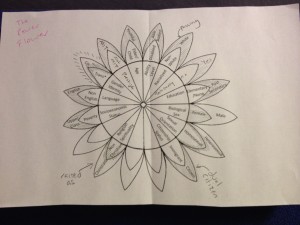I am really excited to get to practice some of the listening techniques we learned about in class last week. Both Mallory and I are out of the country this week, but did some brainstorming last week and have laid out some plans for listening exercises with Lois at teh Griot Museum.
I found the listening technics of flow analysis and activity analysis to be helpful starting points for Mallory and I to keep building out a full picture of what is working (and what isn’t working) for Lois. Flow analysis will help us see what are the usual order of operations for Lois for different buckets of work. I think this will help us see what has been her strategy so far and what she has been able to prioritize given her large and various responsibilities. I think Activity Analysis will help us see the innovative ways that Lois has been tackling the challenges and opportunities of the Griot — in my mind, the Activity Analysis gives a complete picture of all the activities that might be connected to Lois’s work as an ED and will help all of us see which activites have been effective and empowering to her and the museum.
We were also excited about using the listening technique of Forecasting. This was a new technique for me. I think the point of this listening technique is to challenge us to predict the future, both the positive and the negative. So much of what the Griot will be working with to strengthen the organization will be things that have unpredictable consequences. For example, new developments are something that the Griot might want to work with to strengthen the organization, but the affects of these new developments on the Griot is difficult to predict. It would be great to practice thinking about what is the best case scenario for the impact of these new developments on the Griot…and what is the worst case scenario for the implact of these new developments on the Griot.
I also am excited to try doing some stakeholder mapping. I am still looking into new tools we can use to do stakeholder mapping (please tell me if you all know of any!). A few of us in class are looking to learn more about good , new strategies here. I’ve used a tool that has two axises (one about whether a stakeholder is for/against your cause, the other for how much formal power/authority the stakeholder has) that has worked well. Still, I’m wondering if there are other models out there for stakeholder mapping.
We plan to do some of these listening activites either as email or a phone call since we are in a different city from Lois. It will be a nice challenge to see if we can figure out ways to do these kinds of listening that are engaging and interactive when we’re not in the same room!
